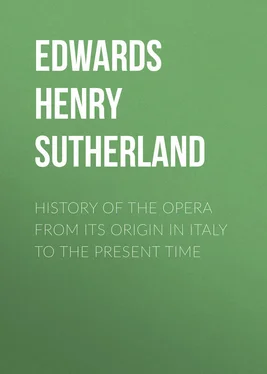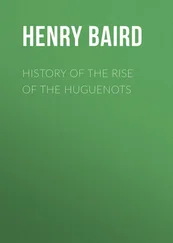Henry Edwards - History of the Opera from its Origin in Italy to the present Time
Здесь есть возможность читать онлайн «Henry Edwards - History of the Opera from its Origin in Italy to the present Time» — ознакомительный отрывок электронной книги совершенно бесплатно, а после прочтения отрывка купить полную версию. В некоторых случаях можно слушать аудио, скачать через торрент в формате fb2 и присутствует краткое содержание. Жанр: foreign_home, music_dancing, foreign_antique, foreign_prose, на английском языке. Описание произведения, (предисловие) а так же отзывы посетителей доступны на портале библиотеки ЛибКат.
- Название:History of the Opera from its Origin in Italy to the present Time
- Автор:
- Жанр:
- Год:неизвестен
- ISBN:нет данных
- Рейтинг книги:4 / 5. Голосов: 1
-
Избранное:Добавить в избранное
- Отзывы:
-
Ваша оценка:
- 80
- 1
- 2
- 3
- 4
- 5
History of the Opera from its Origin in Italy to the present Time: краткое содержание, описание и аннотация
Предлагаем к чтению аннотацию, описание, краткое содержание или предисловие (зависит от того, что написал сам автор книги «History of the Opera from its Origin in Italy to the present Time»). Если вы не нашли необходимую информацию о книге — напишите в комментариях, мы постараемся отыскать её.
History of the Opera from its Origin in Italy to the present Time — читать онлайн ознакомительный отрывок
Ниже представлен текст книги, разбитый по страницам. Система сохранения места последней прочитанной страницы, позволяет с удобством читать онлайн бесплатно книгу «History of the Opera from its Origin in Italy to the present Time», без необходимости каждый раз заново искать на чём Вы остановились. Поставьте закладку, и сможете в любой момент перейти на страницу, на которой закончили чтение.
Интервал:
Закладка:
New music was composed to the libretto of Dafne by Gagliano in 1608, when the opera thus rearranged was performed at Mantua; and in 1627 the same piece was translated by Opitz, "the father of the lyric stage in Germany," as he is called, set to music by Schutz, and represented at Dresden on the occasion of the marriage of the Landgrave of Hesse with the sister of John-George I., Elector of Saxony. It was not, however, until 1692 that Keiser appeared and perfected the forms of the German Opera. Keiser was scarcely nineteen years of age when he produced at the Court of Wolfenbüttel, Ismene and Basilius , the former styled a Pastoral, the latter an opera. It is said reproachfully, and as if facetiously, of a common-place German musician in the present day, that he is "of the Wolfenbüttel school," just as it is considered comic in France to taunt a singer or player with having come from Carpentras. It is curious that Wolfenbüttel in Germany, and Carpentras in France (as I shall show in the next chapter), were the cradles of Opera in their respective countries.
To return to the Opera in Italy. The earliest musical drama, then, with choruses, recitatives, airs, and instrumental preludes was Dafne , by Rinuccini as librettist, and Caccini and Peri as composers; but the orchestra which accompanied this work consisted only of a harpsichord, a species of guitar called a chitarone, a lyre, and a lute. When Monteverde appeared, he introduced the modern scale, and changed the whole harmonic system of his predecessors. He at the same time gave far greater importance in his operas to the accompaniments, and increased to a remarkable extent the number of musicians in the orchestra, which under his arrangement included every kind of instrument known at the time. Many of Monteverde's instruments are now obsolete. This composer, the unacknowledged prototype of our modern cultivators of orchestral effects, made use of a separate combination of instruments to announce the entry and return of each personage in his operas; a dramatic means employed afterwards by Hoffmann in his Undine , 3 3 See Vol. II.
and in the present day with pretended novelty by Richard Wagner. This newest orchestral device is also the oldest. The score of Monteverde's Orfeo , produced in 1608, contains parts for two harpsichords, two lyres or violas with thirteen strings, ten violas, three bass violas, two double basses, a double harp (with two rows of strings), two French violins, besides guitars, organs, a flute, clarions, and even trombones. The bass violas accompanied Orpheus, the violas Eurydice, the trombones Pluto, the small organ Apollo; Charon, strangely enough, sang to the music of the guitar.
Monteverde, having become chapel master at the church of St. Mark, produced at Venice Arianna , of which Rinuccini had written the libretto. This was followed by other works of the same kind, which were produced with great magnificence, until the fame of the Venetian operas spread throughout Italy, and by the middle of the seventeenth century the new entertainment was established at Venice, Bologna, Rome, Turin, Naples, and Messina. Popes, cardinals and the most illustrious nobles took the Opera under their protection, and the dukes of Mantua and Modena distinguished themselves by the munificence of their patronage.
Among the most celebrated of the female singers of this period were Catarina Martinella of Rome, Archilei, Francesca Caccini (daughter of the composer of that name and herself the author of an operatic score), Adriana Baroni, of Mantua, and her daughter Leonora Baroni, whose praises have been sung by Milton in his three Latin poems "Ad Leonoram Romæ canentem."
The Italian opera, as we shall afterwards see, was introduced into France under the auspices of Cardinal Mazarin, who as the Abbé Mazarini, had visited all the principal theatres of Italy by the express command of Richelieu, and had studied their system with a view to the more perfect representation of the cardinal-minister's tragedies. The Italian Opera he introduced on his own account, and it was, on the whole, very inhospitably received. Indeed, from the establishment of the French Opera under Cambert and his successor Lulli, in the latter half of the seventeenth century, until the end of the eighteenth, the French were unable to understand or unwilling to acknowledge the immense superiority of the Italians in everything pertaining to music. In 1752 Pergolese's Serva Padrona was the cause of the celebrated dispute between the partisans of French and Italian Opera, and the end of it was that La Serva Padrona was hissed, and the two singers who appeared in it driven from Paris.
In England the Italian Opera was introduced in the first years of the eighteenth century, and under Handel, who arrived in London in 1710, attained the greatest perfection. Since the production of Handel's last dramatic work, in 1740, the Italian Opera has continued to be represented in London with scarcely noticeable intervals until the present day, and, on the whole, with remarkable excellence.
Of English Opera a far less satisfactory account can be given. Its traditions exist by no means in an unbroken line. Purcell wrote English operas, and was far in advance of all the composers of his time, except, no doubt, those of Italy, who, we must remember were his masters, though he did not slavishly copy them. Since then, we have had composers (for the stage, I mean) who have utterly failed; composers, like Dr. Arne, who have written Anglo-Italian operas; composers of "ballad operas," which are not operas at all; composers of imitation-operas of all kinds; and lastly, the composers of the present day, by whom the long wished-for English Opera will perhaps at last be established.
In Germany, which, since the time of Handel and Hasse, has produced an abundance of great composers for the stage, the national opera until Gluck (including Gluck's earlier works), was imitated almost entirely from that of Italy; and the Italian method of singing being the true and only method has always prevailed.
Throughout the eighteenth century, we find the great Italian singers travelling to all parts of Europe and carrying with them the operas of the best Italian masters. In each of the countries where the opera has been cultivated, it has had a different history, but from the beginning until the end of the eighteenth century, the Italian Opera flourished in Italy, and also in Germany and in England; whereas France persisted in rejecting the musical teaching of a foreign land until the utter insufficiency of her own operatic system became too evident to be any longer denied. She remained separated from the rest of Europe in a musical sense until the time of the Revolution, as she has since and from very different reasons been separated from it politically.
Nevertheless, the history of the Opera in France is of great interest, like the history of every other art in that country which has engaged the attention of its ingenious amateurs and critics. Only, for a considerable period it must be treated apart.
In the course of this narrative sketch, which does not claim to be a scientific history, I shall pursue, as far as possible, the chronological method; but it is one which the necessities of the subject will often cause me to depart from.
CHAPTER II.
INTRODUCTION OF THE OPERA INTO FRANCE AND ENGLAND
French Opera not founded by Lulli. – Lulli's elevation from the kitchen to the orchestra. – Lulli, M. de Pourceaugnac, and Louis XIV. – Buffoonery rewarded. – A disreputable tenor. – Virtuous precaution of a prima donna . – Orthography of a stage Queen. – A cure for love. – Mademoiselle de Maupin. – A composer of sacred music. – Food for cattle. – Cambert in England. – The first English Opera. – Music under Cromwell. – Music under Charles II. – Grabut and Dryden. – Purcell.
Читать дальшеИнтервал:
Закладка:
Похожие книги на «History of the Opera from its Origin in Italy to the present Time»
Представляем Вашему вниманию похожие книги на «History of the Opera from its Origin in Italy to the present Time» списком для выбора. Мы отобрали схожую по названию и смыслу литературу в надежде предоставить читателям больше вариантов отыскать новые, интересные, ещё непрочитанные произведения.
Обсуждение, отзывы о книге «History of the Opera from its Origin in Italy to the present Time» и просто собственные мнения читателей. Оставьте ваши комментарии, напишите, что Вы думаете о произведении, его смысле или главных героях. Укажите что конкретно понравилось, а что нет, и почему Вы так считаете.












